The Limits of Compassion
A community of reason and compassion. That is how we describe the Houston Oasis Community. It’s an encapsulation of the community’s core values. Yet beneath this simple expression lies complexity and ambiguity. Recent experiences have brought me face to face with the difficulties hidden in the compassionate element of our characterization.
Near my townhouse in Midtown lies perhaps the largest contingent of homeless people in the city of Houston. Living underneath Highway 59 near the intersection of Wheeler and Caroline streets, many of them reside in tents donated by churches and other charitable organizations. They favor this location because it’s close to a number of public facilities, including a grocery store, fast food restaurants and Metro’s Wheeler Transit Station.
This “tent city,” or my “sister city” as I affectionately refer to it, sprang up just prior to Super Bowl LI in February, 2017. The official explanation to the contrary, I believe it to be a consequence of the city forcing a relocation in an attempt to hide its homeless problem from visitors coming to town for the game. The impact of their presence is not insignificant. The selling price of my townhouse dropped by $100,000. Local businesses have experienced reductions in customer traffic because people avoid the annoyance of constant panhandling.
I experience episodes of panhandling so frequently I have become something of an expert in the tactics employed to get money or food. I recall one encounter in a grocery store where a grizzled man walked up to my shopping cart and dropped in two 5-lb bags of chicken wings, declaring he needed them to feed his grandchildren. After a moment of shock and realizing that he wanted me to pay more than $30 for his grandchildren, I rebuffed his request. There are better ways to feed hungry children (assuming they aren't fictional) and I wasn’t inclined to double the cost of my trip to the store.
But such encounters plunged me into a personal conundrum. As a member of the Oasis community I felt torn by my desire to live up to its standards of compassion and the reality of dealing with people living in such unfortunate circumstances.
At Oasis, when we speak of helping the homeless, we often conjure up visions of a battered woman fleeing into the night with her children to escape violence, or a family forced from their home by a catastrophic event such as a fire, a layoff, or perhaps the cost of a severe illness. Showing compassion in these circumstances is a no-brainer. The circumstances I face are quite different – and contemplating these differences helped me resolve my emotional turmoil.
First, there is no need to feel a lack of compassion if the act of providing it is both detrimental to the person showing compassion and of little help to the receiver. No one can give money to every individual who requests it. No matter how much an individual is given they have the capacity to spend it and then ask for more. No one would expect an individual to face financial hardship in the name of compassion to a stranger. Beyond this, giving money does nothing to alleviate the predicament the homeless face. This requires the resources of government.
Second, there is no call to feel a lack of compassion if the request is couched in deception. Virtually every encounter begins with a lie about why they need assistance. Through experience the homeless have developed the skills of a consummate salesman – how to handle objections, how to get an initial small commitment and then try to turn it into a larger one, and how to play on emotion. I recall when a lady approached me, asking for money. From her leathered skin and worn clothes it was clear she was a homeless woman (I’ve seen her among the tents since), but she claimed she had just arrived from Beaumont and wanted to know if the people in Tent City were dangerous. I understood she was trying to gain empathy by instilling in me concern for a vulnerable woman facing possible danger (before she asked for money).
Finally, compassion is not warranted if the need is self-created. In large part the homeless contingent around me are there because they reject help available to them. There are shelters, food sources, and other aid available, but they openly spurn them. They do not want to live with the constraints imposed by accepting assistance. The use of drugs and alcohol is rampant among the homeless in Tent City. This would not be tolerated in a shelter and they would be required to seek treatment.
In the end I concluded the altruism of the Oasis community must be reconciled with reality. I quelled my inner turmoil by recognizing that it is possible to be a person of compassion without answering every call for help. There are caveats: I must endeavor to decline requests with compassion. These are human beings deserving to be treated with courtesy. I confess I still occasionally donate money, or buy some food, often times because I think they have a particularly entertaining tale as to why I should, but in most cases I simply ask their name and use it while politely rejecting their request. This no longer feels like an act of cruel indifference. In fact, it seems to be based on that other Oasis value: reason.

